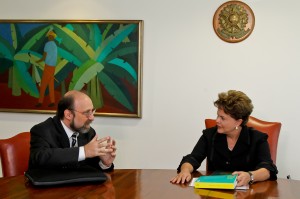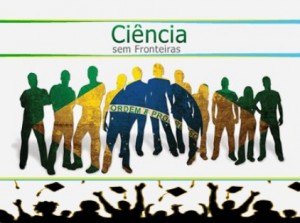On one hand, every soccer fan waits with giddy anticipation for the 2014 World Cup. On the other, many fear the detrimental effects of Brazilian protests, drug traffickers, infectious disease, violent crime, and general civil unrest. Many think these phenomena have the potential to mar what many consider to be latest iteration of the greatest competition humans have ever created. Among these conflicting viewpoints lies a country striving to impart a positive impact on the world. In particular, Brazil has demonstrated a desire to improve science and technology both at home and abroad. One man specifically, Dr. Miguel Nicolelis, has high aspirations for his home country. A few years ago, Dr. Nicolelis, a neuroscience researcher at Duke University, met with Brazilian President Dilma Rousseff to address this very issue. Rousseff and Nicolelis understand the stereotypical opinion Westerners maintain regarding their home country; that Brazil has little more to offer positively than soccer, samba, and Carnival [1]. The purpose of their conference was to determine a method to prove to the world that Brazil has so much more to offer than those activities—that they are moving forward. What better stage than to convey this message than the World Cup?
President Dilma Rousseff and Dr. Miguel Nicolelis
Dr. Nicolelis has devoted his career not just to neuroscience, but also to neuroengineering. While neuroscience seeks to elucidate the nature of the brain and related tissues, which still remain quite uncharacterized, neuroengineering involves a more practical approach. For Dr. Nicolelis, this practicality manifests itself in a project designed to provide a functional “cure” for paralysis. He had made significant breakthroughs in his field prior to this meeting with Rousseff, yet had little concrete basis for what he then proposed [1]. His idea was to begin the World Cup with a simple kick, yet not a kick from a typical Brazilian. Rather, he desired to show the world that Brazilians were capable of doing the unthinkable [1]. He proposed to Ms. Rousseff that the World Cup should kickoff with a young Brazilian paraplegic booting a soccer ball downfield. This seems impossible, right? Well, not with the brain-machine interface technology Nicolelis begin designing perhaps the day after his meeting with the Brazilian President. In an act of sheer confidence, Nicolelis promised he would be able to achieve this goal before the first match to be held in São Paulo, despite the fact he had never really toyed with the intricacies of this technology [1]. That day marked the inception of the Walk Again Project, through which Nicolelis and his research team hope to make this technology available to millions who suffer from paralysis worldwide. Now, he is on track to fulfill his World Cup promise and make Walk Again a reality through a device composed of an exoskeleton controlled by cues from the brain. Upon listening to him speak recently in a Duke lecture hall, it was evident that his prototype would be ready just as he promised. Nicolelis may call a country many relegate to a drug-ridden, crime-ravaged, soccer-crazed haven as home, but he stands at the apex of his scientific field. His successes point to a greater truth in Brazil: science and technology advances in Brazil stand to impart a very measurable positive impact on the world.
Dr. Nicolelis is not the only Brazilian working towards improving human healthcare through biotechnology and biomedical engineering solutions. Brazil as a whole is currently experiencing a period of rapid biotechnology expansion [2]. A strong scientific base has in part inspired this advancement. Additionally, over the course of the last five years the Brazilian government has instituted many policies facilitating the development of health and life science companies and encouraging research. Indeed, 33% of all bioscience companies in Brazil, out of a possible 271, are devoted to improving human health [2]. Government programs seek to support internalization of the biotechnology center to maximize job creation for Brazilians [2]. Additionally, Dilma Rousseff and the rest of the Brazilian government are striving to create an environment in which industry and universities function in tandem. Translational medicine, the process of moving research from a bench in a laboratory to a therapeutic for a patient in a hospital, is best achieved using this concerted approach, and is vital in commercializing the most advanced technologies.
Of course, the bioscience industry has not always existed in an atmosphere conducive to innovation. In the past, advances have been hindered by long patent approval periods and federal red tape. Realizing that these issues needed to be resolved, the National Industrial Property Institute (INPI) has hired more biotechnology examiners and improved internal efficiency, via methodologies such as cooperative agreements with other patent offices [2]. To address the issue of red tape, the Federal Attorney General’s Office (AGU) recently enacted a law to give the INPI exclusive responsibility in analyzing patents [3]. Formerly, the Brazilian Health and Surveillance Agency (ANVISA) also had the right to determine patentability of an invention. Americans and others can attest to the difficulties and frustrations in reaching a consensus on an issue when two entities are involved, let alone one (looking at you U.S. Senators and Representatives) [2]. Many other programs exist that demonstrate Brazilian government agencies and politicians have a strong desire to improve the culture of innovation in Brazil.
Ciência sem Fronteiras=Science without Borders
Rousseff is not only concerned with short-term innovation and policy implementation, as she is expanding her vision to include the youth of Brazil. Her country may be improving dramatically in the sciences, but she understands the likes of Germany, the United States, and France developed their science and technology sectors long ago. These countries and others could therefore serve as incubators for the future scientists and engineers of Brazil. Rousseff believes that investing in science education is one of the most effective ways to bolster Brazil’s economy, and I think many would agree with her, President Obama included [4]. To improve the state of science education in Brazil, Rousseff created Science Without Borders, an initiative that facilitates and subsidizes study abroad experiences for exemplary Brazilian college students studying science, technology, engineering, or mathematics [4]. Some may worry that those who participate in the program will not return thereby nullifying the effects of this investment. This fear is misplaced as scholars in the program—who are indeed honored to have the opportunity to study and improve themselves abroad—feel they have a responsibility and excitement to improve their own country [4]. A viable means to achieve those ends is to supplement courses at home in Brazil with cultural, lingual, and scientific education experience abroad. This initiative will afford Brazilians the opportunity to build connections throughout the world. In an ever-increasingly global economy, international relationships will undoubtedly have a positive influence on technological and scientific development in Brazil. By the same token, motivating more talented Brazilians to study abroad will inform the world that Brazil is a country that should be valued for their scientific prowess.
Scientists are also concerned with the state of those who still reside in Brazil of course. We can all understand the annoyance that is a mosquito, let alone swarms of them. In many cases, mosquitos harbor dangerous diseases such as malaria and dengue fever, infections that are especially prevalent in countries with tropical regions such as Brazil [5]. Roughly 300,000 cases of malaria and 700,000 cases of dengue fever are reported each year in Brazil, which places a significant strain on human health and the Brazilian economy [3] [6]. Naturally, researchers in many countries are attempting to devise malaria and dengue fever vaccines. While some treatments have been effective, oftentimes the medications are expensive. Even worse, not only can some Brazilians not afford the medications, those who live in states located in the Amazon simply do not have access to the treatments. Brazilian scientists are working on a more holistic approach. Instead of devising a human therapy, many groups are developing genetically altered—or transgenic—mosquitoes that would then be introduced into the environment [5]. While concerns about introducing artificial genes into the environment still exist, the idea is brilliant. After introducing a gene that would confer complete resistance to malaria or dengue infection in mosquitoes, these mutants would then be liberated into the wild to reproduce and compete with wild mosquitoes. Eventually, the entire disease would be eradicated from the mosquito population given enough cross-reproduction, according to mathematical models. It may just be a theory, but having been educated in biomedical sciences, I believe their models are valid and have the potential to rid the world, not just Brazil, of one of its worst infectious diseases while reducing the need for costly medications and harmful pesticides. Best of all, the people of Brazil, and citizens of other countries afflicted by malaria and dengue fever, would experience a virtually non-existent cost burden.
Redesigned Superhero Intravenous Module at the A.C. Camargo Cancer Center
Brazil may be responsible for many technical advances in healthcare, but they have not forgotten that there are various approaches to advancing human health. Childhood cancer, disheartening and challenging to treat, has a few new helpful faces at A.C. Camargo Cancer Center in Brazil [7]. These faces are not new doctors or public service workers. Rather, they come from a realm children can more easily understand—the universe of superheroes. Dubbed a “superhero paradise,” the transformed children’s ward has everything from a “Hall of Justice” game room, superhero décor, and intravenous chemotherapy bags disguised as “Superformula” [7]. Anyone who has in some way been affected by cancer knows that one of the keys to success is a positive attitude, which not only boosts morale but also can augment immune system functionality [8].
The above examples should provide some insight into more positive aspects of Brazil. Still developing in many ways, Brazil has numerous problems to tackle. Yet, many within the country understand the necessity for better human health technology and are working towards making that need a reality. Through the lens of biotechnology and healthcare research, we can begin to understand just how Brazil is planning to move forward. These strides are not limited to healthcare however. Energy technology is another sector in which Brazil excels. Given their virtually countless acres of land unsuited for food production but perfect for oil seeds, Brazil stands to become one of the world’s leaders in biodiesel production [9]. Brazil could essentially become energy independent, while creating jobs in farming communities and reducing harmful emissions stemming from petroleum based fuels [9]. Sugarcane based ethanol could achieve the same ends [9]. Brazil is often touted as a leader in agricultural and environmental protective technology as well. A Brazilian company, BUG Agentes Biológicos, has managed to improve both simultaneously [10]. By producing wasps that are programmed to only target the larvae and eggs of agricultural pests, BUG has devised a clever strategy that reduces the use of pesticides in food production. As a result, food quality has increased while environmental stress has decreased. Monsanto should take notes.
Brazil has demonstrated an ability to devise clever solutions that benefit people both in Brazil and abroad. Yet, an article written by Rafael Dias and Milena Serafim from the Georgia Institute of Technology argues that Brazilian science and technology policy has been “shaped by scientists for scientists” [11]. It would make sense that those performing the research would drive technological and scientific innovation. The examples outlined above serve as a contrasting viewpoint of who will benefit from this research. Perhaps industries such as information technology or aerospace engineering will primarily serve a select few, but healthcare, scientific education, energy, and environmental advances will profit everyone. The gift of locomotion to a paraplegic, eradicating malaria and dengue fever, and reducing pesticide usage would not be gifts limited to a select few.
Considering this essay exists on a website devoted to soccer politics, you may be asking yourself, how does this all fit in to the 2014 World Cup? At face value, it really has nothing to do with soccer. But as Miguel Nicolelis and Dilma Rousseff discussed, a World Cup is not merely a showcase of world-class soccer, futebol, Fußball, soka, サッカー, القدم, etc. The World Cup, like the Olympics, places the host country in a global spotlight. We all want to look our best when everyone is watching, and Brazil is no different. Brazil has much to offer the world, and yet apart from praising stereotypical Brazilian activities, the media has largely focused on the country’s problems. Persistent crime, drug trafficking, internal corruption, poor infrastructure, and poverty have been covered thoroughly. But is any country perfect? These issues exist in “fully developed” countries too, and yet the media would likely take a drastically different prospective angle if the World Cup were in Western Europe or the United States. Ultimately, Brazil remains one of the world’s fastest growing and most promising economies, in large part due to a bustling science and technology sector. Remember, there is more to love about Brazil than soccer, samba, and Carnival, but of course, that does not mean I am not giddy with excitement myself for June 12, 2014.
Brazil: More than Soccer, Samba, And Carnival HomeHow to cite this page: “Brazil Moving Forward,” Written by Jarrett Link (2013), World Cup 2014, Soccer Politics Blog, Duke University, http://sites.duke.edu/wcwp/world-cup-2014/politics-in-brazil/brazilmovingforward/ (accessed on (date)).
References
|
[1] |
Miguel Nicolelis, Walk Again Project, November 11, 2013, Presentation given at Duke University. |
|
[2] |
Vania Resende, “The Biotechnology Market in Brazil,” United States Department of Commerce, Overview February 2012. |
|
[3] |
Joseli Oliveira-Ferreira et al., “Malaria in Brazil: an overview,” Malaria Journal, vol. 9, no. 115, April 2010. |
|
[4] |
Carol Schmidt. (2012, April) Montana State University. [Online]. http://www.montana.edu/news/11209/brazilian-students-hope-to-engineer-technological-advances-with-msu-exchange |
|
[5] |
M. Rafikov, L. Bevilacqua, and A. Wyse, “Optimal control strategy of malarial vector using genetically modified mosquitos,” Journal of Theoretical Biology, vol. 258, no. 3, pp. 418-425, June 2009. |
|
[6] |
OXITEC. [Online]. http://www.oxitec.com/health/dengue-information-centre/brazil-dengue-case-study/ |
|
[7] |
(2013, June) Huffington Post. [Online]. http://www.huffingtonpost.com/2013/06/03/children-cancer-center-brazil-superheroes_n_3379428.html |
|
[8] |
(2010, March) Live Science. [Online]. http://www.livescience.com/8158-optimism-boosts-immune-system.html |
|
[9] |
Laura Somoggi. (2005, April) MIT Technology Review. [Online]. http://www.technologyreview.com/featuredstory/403888/brazil/ |
|
[10] |
(2013) Bug Agentes Biológicos. [Online]. http://www.bugbrasil.com.br/ |
|
[11] |
Rafael Dias and Milena Serafim. (2011) Smart Technology Georgia Tech. [Online]. https://smartech.gatech.edu/bitstream/handle/1853/42511/500-1607-2-PB.pdf |




